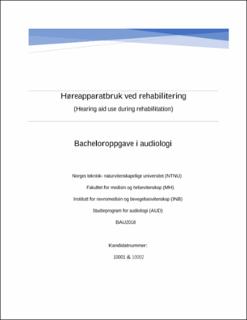| dc.contributor.advisor | Odd Magne Risan | |
| dc.contributor.author | Mehdi Jafari | |
| dc.contributor.author | | |
| dc.contributor.author | Muhiddin Mohammad Alhaj Hassan | |
| dc.date.accessioned | 2021-09-25T16:31:41Z | |
| dc.date.available | 2021-09-25T16:31:41Z | |
| dc.date.issued | 2021 | |
| dc.identifier | no.ntnu:inspera:90114369:90130966 | |
| dc.identifier.uri | https://hdl.handle.net/11250/2783261 | |
| dc.description.abstract | Sammendrag
Introduksjon: Forskninger viser at det er mange utdelte høreapparater som er ikke i bruk og mange mennesker med hørselstap søker imidlertid ikke hjelp, og enda færre bruker høreapparat. Ubehandlet hørselstap kan ha effekt på fysisk og kognitiv funksjon hos mennesker. I tillegg kan hørselsnedsettelse føre til sosiale og følelsesmessige problemer. Høreapparat kan redusere disse vanskelighetene og kan øke livskvaliteten til brukerne.
Hensikt: Målet med studien er å finne ut årsaken til at personer med nedsatt hørsel ikke bruker høreapparatet sitt ved rehabilitering.
Metode: Det ble valgt litteraturstudie som metode for å gjennomføre studien, slik at man kan bruke tilgjengelige forskning for å identifisere ny kunnskap på bakgrunn av materialet. Det har blitt diskutert og sammenlignet fem kvalitative, fire kvantitative forskningsartikler og en artikkel som kombinerte begge metodene.
Resultat: Studiens resultater viser at det er mange faktorer som påvirker brukerne for ikke å benytte sine høreapparater ved rehabilitering. Blant disse faktorene er stigma og identitet, ikke nødvendighet, skuffelse, motivasjon, stoler ikke på audiografer, ubehag, skeptisk mot nye teknologi, sosialøkonomisk status, press fra andre og mangel på rådgivning.
Konklusjon: Det er mange faktorer som har stor betydning for høreapparatbruk. De brukerne som har høreapparater, men vil ikke bruke dem ved rehabilitering, har ulike oppfatninger og opplevelser ved bruk av høreapparater. En av de viktigste personlige barrierene for høreapparat bruk er opplevelsen av stigma og effekten dette har på brukeren. Noen ganger føler ikke alle at de har behovet for høreapparater og dette skyldes at hørselsvansker ikke oppleves som subjektivt problem. | |
| dc.description.abstract | Abstract
Introduction: The studies indicate that there are many distributed hearing aids that are not in use and many other people with hearing problems do not seek support, and even fewer of them use hearing aids. Untreated hearing loss can have a detrimental effect on patient's physical and cognitive function. In addition, hearing loss can lead to social and emotional problems. Hearing aids can reduce these difficulties and can increase the quality of life for the patients.
Objective: The objective of this study was to find out the reason why people with hearing loss do not use their hearing aids during rehabilitation.
Design: Literature review was chosen as our method, as this would contribute to gathering and analyzing available material on the topic to gain new knowledge. We have discussed and compared five qualitative, four quantitative research articles and one article which combined both methods.
Result: The results of this study indicate that there are many factors that influence the patients not to use their hearing aids during rehabilitation. Among these factors are stigma and identity, not necessity, disappointment, motivation, do not trust audiologists, discomfort, skeptical of new technology, socioeconomic status, pressure from others and lack of advice.
Conclusion: There are many factors that are very important for the use of hearing aids. The patients who own hearing aids, but do not use them, have different perceptions and experiences about the hearing aids. One of the most important personal barriers to hearing aid use is the experience of stigma and the effect it has on the patients. Sometimes not everyone feels that they need hearing aids, and this is because hearing difficulties are not perceived as a subjective problem. | |
| dc.language | nob | |
| dc.publisher | NTNU | |
| dc.title | Høreapparatbruk ved Rehabilitering | |
| dc.type | Bachelor thesis | |
